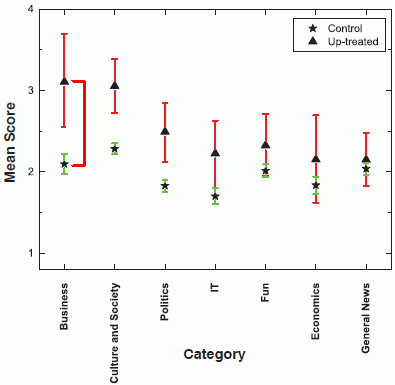Like spawns like: what affects the rating on the Internet
 On August 8, the journal Science published an interesting article ( full article for money , short description ) about the study of the behavior of users of social networks. The main conclusion of the study: the advantages (or likes) of posts to a large extent stimulate the following users to take similar actions. At the same time, cons (dislikes) in general do not produce a significant effect. From this we can draw another conclusion - you can not blindly trust the majority opinion on the Internet.
On August 8, the journal Science published an interesting article ( full article for money , short description ) about the study of the behavior of users of social networks. The main conclusion of the study: the advantages (or likes) of posts to a large extent stimulate the following users to take similar actions. At the same time, cons (dislikes) in general do not produce a significant effect. From this we can draw another conclusion - you can not blindly trust the majority opinion on the Internet.But besides the conclusions, the study has at least one more interesting feature. The “ test subjects ” were Russian-speaking users of the Russian social news resource News2.ru , an analogue of Reddit.com or Digg.com. Let's take a closer look at who, what and why investigated.
Like on Habré, on News2, users can post comments on posts and post comments on pluses / minuses. A group of researchers from the University of Jerusalem, the University of New York and MIT conducted a randomized experiment on the site for 5 months. Some randomly selected new comments were put with a plus or a minus and the reaction of users was observed. In total, 100,000 comments were studied in this way, which together were viewed 10 million times and estimated 300 thousand times.
 As it turned out, the likelihood that the next user will put a plus after the "undeserved" plus increased by 32%. As a result, comments artificially received received 25% more pluses than intact ones . And the chances of a comment to gain more than 10 pluses increased by 30% - there is a snowball. Sorry for the illustration on the right, could not resist.
As it turned out, the likelihood that the next user will put a plus after the "undeserved" plus increased by 32%. As a result, comments artificially received received 25% more pluses than intact ones . And the chances of a comment to gain more than 10 pluses increased by 30% - there is a snowball. Sorry for the illustration on the right, could not resist.')
For artificially mined comments, oddly enough, the tendency toward a negative snowball was balanced by an increased likelihood of getting a plus — as if users were trying to establish justice. In general, asymmetry was observed in the herd effect. By the way, the herd effect is a scientific term.
Interestingly, this effect manifested itself very differently depending on the topic of discussion. Most notably, he was in posts about business, society and politics (as opposed to “IT” and “Entertainment”, for example). I would say that it is close to life: talking about the government or start-ups is usually more emotional than about Java or cats. Perhaps in these topics we are more influenced by the opinions of the masses.

The graph shows the gap between the average estimate of the artificially written comment (indicated by
 ) and intact (indicated by
) and intact (indicated by  ) in various topics of posts. The greater the gap - the more significant the herd effect in the subject.
) in various topics of posts. The greater the gap - the more significant the herd effect in the subject.The purpose of the whole study was to check how the majority opinion can influence your assessment, and whether this influence can accumulate. After all, the influenced user himself expresses his opinion, thereby increasing the influence on the following readers. In addition to deepening the understanding of the processes of forming public opinion, this is also important because the Web is full of hundreds and thousands of sites that, based on user feedback, rate some product or service. For example, I myself have actively used such sites as booking.com, Yandex.Market and IMDB for the last month. They largely determined where I went to rest, what I bought and what movie I watched. If I were not a social phobia and used Facebook, I would probably have been affected by the likes of my friends.
By the way, the influence of friends (or better said “members of a virtual social group”) also turned out to be very noticeable. On News2 there is a rather complex system of connections between users - there are not only “friends”, but also “enemies”. Friends were more likely to have added artificially commented comments to each other, and they almost always added artificially mined messages. But the enemies almost did not succumb to the manipulation - their assessments practically did not change as a result of the plus / minus manipulation. Do you want to know the truth? Ask your enemy!
The head of the group of scientists Sinan Aral says that such results give more questions than answers. Of course, this is what any scientist who wants to emphasize the fundamental nature of his work should say. But the truth would be curious to understand whether, for example, it is necessary to immediately change the rating mechanism on the Internet.
I think we will see the continuation of this work of scientists. In the meantime, well, let's keep a sober look at things.
Source: https://habr.com/ru/post/189612/
All Articles